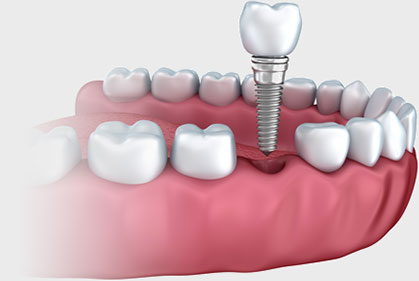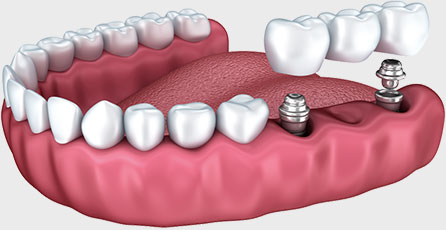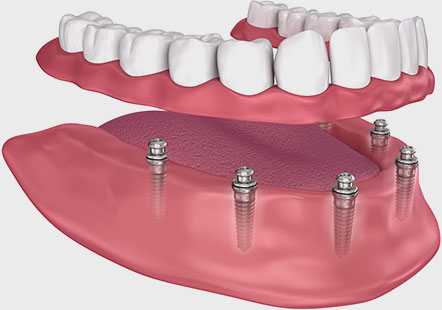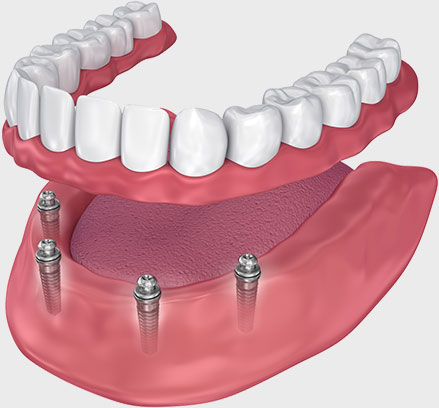Dental Implants
- What Are Dental Implants?
- Dental Implant Benefits
- Dental Implant Candidates
- Living with Missing Teeth
- Dental Implant Options
- Dental Implant Procedure
- Implant Surgery Recovery
- Life After Dental Implants
- Dental Implants Cost
- How Long Dental Implants Last
- Causes of Implant Failure
- Dental Implants Safety
- Dental Implant Alternatives
- Full Mouth Rehabilitation with Implants
- Choosing an Implant Dentist
- Dental Implant FAQs
For all of the aesthetic and functional issues presented by missing teeth, dental implants offer a premier solution. Dental implants at our fully equipped San Diego practice can replace gaps in your smile with results that look and feel completely natural. These advanced restorations provide unmatched security, reliability, and comfort when rehabilitating your smile, reclaiming the ability to speak, drink, and eat all of your favorite foods with confidence. Thanks to our skilled on-site dental specialists at Scripps Center for Dental Care, our team can complete the entire dental implant process completely in-house. All implants are placed by board-certified specialists who are extensively trained in periodontics and oral and maxillofacial surgery, making them uniquely qualified to place and maintain dental implants, administer anesthesia, and craft a custom restoration that blends in seamlessly with your smile. With our team approach, patients in San Diego feel relaxed and confident throughout every stage of their treatment.
What Are Dental Implants?
Dental implants are titanium posts designed to mimic the natural root of a tooth. Made of medical-grade titanium, implants are anchored to the gums and stimulate the underlying bone in the same way as your natural tooth roots. By topping an implant with a custom crown, dental bridge, or denture (depending on the extent of your tooth loss), patients can replace one, several, or all of their teeth with high-quality restorations that look and feel natural.
What Are the Benefits of Dental Implants?
If you’re missing one or more of your natural teeth, you’re far from alone. At Scripps Center for Dental Care, our team of multispecialty dentists understand how difficult it can be to live with gaps in your smile — not only from a cosmetic standpoint, but also due to dysfunction from pain, gum sensitivity, and difficulty biting. Dental implants provide strength, durability, and lasting beauty, often making them the preferred solution to replace missing teeth by both dentists and patients. Unlike other options, dental implants allow a myriad of benefits that enhance the form and function of your smile, such as:

- Long-term tooth replacement that lasts as long as your natural teeth
- Greater confidence when eating or speaking
- Ability to enjoy all of your favorite foods again without restriction
- Stimulates jawbone growth in the areas affected by missing teeth, preventing further bone loss
- No additional maintenance other than brushing, flossing, and taking care of your natural teeth
- Security and stability for patients who wear dentures — no more slipping, sliding, or movement along the gumline
Replacing lost teeth with dental implants also usually allows patients to enjoy more nutritious foods, such as crunchy vegetables, nuts, salads, meats, and other meals that may have been difficult to chew with missing teeth.
Are Dental Implants Right for Me?
Dental implants can help a wide range of patients restore the functionality and aesthetic appeal lost from their missing teeth. While many individuals are good candidates for dental implants, it’s necessary for patients to be in adequate health — both generally speaking and with regard to their oral wellness. In some cases, periodontal treatment to eradicate gum disease may be necessary before it’s safe to undergo the dental implant process.
Those interested in dental implants should also have enough jawbone support to accommodate the restorations. Given that the bone starts to gradually recede whenever a tooth root is not present to stimulate the jaw, some individuals may have too much bone loss to immediately receive implants. During a consultation, our multispecialty team will be able to evaluate the state of your jawbone and determine whether you have enough bone volume to support your dental implants. Fortunately, there are many options available for patients who require a greater amount of bone density before it’s safe to undergo implant surgery. In addition to potentially utilizing mini dental implants — which typically do not require as much bone support to secure when compared to full-sized implants — our team can also discuss the possibility of a dental bridge or a bone grafting procedure with you.
Consequences of Living with Missing Teeth
It’s no secret that missing teeth prevent you from enjoying a bright, beautiful smile, but neglecting to replace a lost or extracted tooth can also have more than just cosmetic repercussions. When there’s no tooth root stimulating the jawbone, the foundation of the jaw can gradually erode. This reduces stability for your teeth and often shortens the distance between your nose and chin. In addition, living with missing teeth may also cause:
- Difficulty chewing nutritious and crunchy foods, leading to an unhealthy diet
- The shifting of surrounding teeth, potentially requiring orthodontics to correct
- Jaw misalignment and a poor bite
- Changes in your speech or speech impediments
- Reduced confidence when smiling or speaking
Even if you’re not a candidate for dental implants, it’s important to still replace missing teeth with other restorative options in order to prevent your healthy teeth from shifting out of place. Our team can speak with you about your needs and recommend an ideal restorative solution to repair your smile.
Types of Dental Implants
We offer a comprehensive range of implant options to suit your needs. Whether you‘re missing a single tooth, several teeth in a quadrant, or a full arch, we can help you determine which treatment can provide the best possible results.
Single Tooth Implants
If you’re missing a single tooth or you undergo an extraction, individual dental implants can be affixed to the underlying jawbone to serve as the replacement for your natural tooth root. Once anchored below the gumline, a dental implant should look and feel just like your surrounding teeth. Altogether, the dental implant is composed of a titanium post, an abutment, and a restoration — usually a crown when replacing a single tooth. This implant serves as the artificial tooth root while the dental crown acts as the visible tooth body.
All three pieces may not be attached during the same appointment. In general, your permanent crown is only connected to the abutment once the osseointegration (bone fusing) process is complete. This usually takes about four to six months, but rest assured that a temporary crown is placed in the meantime. The final result should blend in seamlessly with the shade, color, and proportions of your smile.


Multiple Teeth Dental Implants
If you need to replace multiple missing teeth in a row, our dental team also offers implant-supported bridges as well as implant-anchored partial dentures to close the gap between your healthy teeth. This involves anchoring a set of artificial, custom-made teeth to the underlying jawbone with two to four implants. Unlike dental bridges attached using crowns, implant-secured restorations help prevent bone recession and allow greater confidence when eating and speaking. Plus, our porcelain bridges bear a stunning resemblance to the translucency of natural tooth enamel.
Implant-Supported Dentures
Implant dentures are effective for replacing an entire row of missing teeth. This restores form and function in the entirety of the upper and/or lower dental arches, giving patients the ability to bite and smile again. Implant-supported dentures address the many inconveniences associated with traditional dentures, such as gum slippage and difficulty chewing. The custom-made denture is anchored to the underlying bone structure using anywhere from four to eight implants, depending on each patient’s needs.


All-on-4™ Teeth in a Day
Advancements in the field of implant dentistry and our advanced Digital Smile Design technology now allow for the replacement of full sets of missing or severely damaged teeth in one procedure, eliminating the need for multiple treatment sessions. The All-on-4® system is fully customized to ensure an optimal fit, natural color, and ideal shape and size for your new smile. Using advanced 3D scanning technology, we precisely capture the measurements of your bone structure and bite. Our multispecialty dental team then digitally designs your implant dentistry plan, simulating the surgery and expected results before any treatment begins.
Once the ideal approach is determined, the procedure is performed using computed tomography (CT) guides to ensure precise implant placement. Finally, a set of custom-designed artificial teeth is securely attached to the implants. Typically, between four and six implants are required to restore a full upper or lower jaw, and we will review the specifics of your treatment plan during your initial consultation. Your comfort and well-being are our top priorities, and we are committed to making the All-on-4® process as smooth and stress-free as possible.
Immediate Load “Same Day” Implants
While the implant process is usually completed in multiple stages, our practice offers the option of same day (immediate load) implants to shorten the “time to teeth” and minimize the delay involved in securing a restoration to the implant. This technique allows placement of a restoration within 48 hours of implant surgery, whereas other approaches require a healing period of several months before attaching a prosthesis. Immediate load implants include the advantages of a single surgical procedure and the ability to restore the tooth faster than the typical length of treatment. The best candidates for immediate load implants include patients with the requisite bone density to complete the procedure in one visit, among other determining factors.
How Is the Dental Implant Procedure Performed?
When patients come to our office for dental implants, the first step in the process is a consultation. During your meeting, we will often acquire a computed tomography three-dimensional image of your jaw, which will help determine whether you are a suitable candidate for implant dentistry and help you set goals for your treatment. This scan will allow our surgeons and restoring dentists to virtually place an implant and assess the surgical and restorative parameters without beginning treatment or getting numb.
Once it has been determined that dental implants are a good option for you, we will prepare your mouth to receive the dental implant. The surgical placement of the implant itself is much less traumatic than having a tooth removed and most of our patients do not notice any swelling or discomfort.
After the implant is placed, it takes roughly three to six months for your bone to fuse with the titanium, creating a stable and dependable foundation to build your custom-crafted replacement teeth.
During your final visit with our implant dentistry specialist, your beautiful, custom-crafted prosthetic teeth are attached to the dental implants. Our patients who choose dental implants to replace missing teeth are often surprised by their renewed chewing and speaking abilities. They often discover that the restorations are so natural-looking that others can’t tell they have had work done!

During your final visit with implant dentistry specialist, your beautiful, custom-crafted prosthetic teeth are attached to the dental implants. Our patients who choose dental implants to replace missing teeth are often surprised by their renewed chewing and speaking abilities. They often discover that the restorations are so natural-looking that others can’t tell they have had work done!
Implant Dentistry and Your Comfort
At Scripps Center for Dental Care, we understand that dental anxiety prevents many patients from seeking the treatments they need to achieve beautiful and healthy smiles. To help our patients relax during their procedures, we offer a number of safe sedation options, including Nitrous Oxide, Oral Conscious Sedation, Intravenous Sedation, and General Anesthesia. Sedation dentistry allows even the most complex procedures, including dental implant placement, to be completed more quickly and easily.
Everything went as scheduled today with the addition of a crown to my implanted metal stud. It feels great! Another professional procedure done with precision as on many other occasions during the last 18 years.
EDWARD G Haderer
April 25, 2017
What is Recovery From Implant Surgery Like?
While the recovery period after getting your implants placed is usually minimal, our team will provide you with aftercare instructions so you know what to expect after your procedure. Facial swelling and minor bleeding following implant surgery is normal, and your oral surgeon may ask you to bite down on gauze pads afterwards to stymie the bleeding. Once a blood clot forms, it’s important to avoid disturbing the surgical site with your tongue or fingers. Ice packs can also be applied to the sides of the face to help alleviate swelling and bruising.
Extensive downtime generally isn’t necessary, although some patients take one to two days from work and social commitments to rest properly. Exercise and physical activities should be avoided immediately after surgery, as anything strenuous can cause the mouth to throb and potentially bleed. Your dentist will provide you with information about what to eat and drink to best facilitate the healing process. Over the following months, your implants should integrate with your jawbone and eventually feel like a natural part of your mouth. At this time, a realistic-looking restoration — such as a dental crown, bridge, or denture — can be affixed to the implant and complete your brand new tooth replacement.
Life After Dental Implants
Once implant(s) fully integrate with the jaw, patients are typically amazed by how natural their restorations look and feel in their mouth! You should have an improved bite and be able to chew the tough, crunchy foods you may have not been able to eat with missing teeth. As a result, many patients are able to adopt a healthier diet. Implants can also prevent bone resorption and strengthen your underlying jawbone, leading to positive effects to your oral health as well.
While dental implants are durable and last well into the future, certain risk factors may affect the condition of your implants. Our team recommends taking good care of your teeth by brushing and flossing regularly, as well as not smoking to maximize the longevity of your smile. We also suggest wearing a night guard if you’re prone to clenching and grinding your teeth while asleep. This can help prevent unnecessary wear and tear on your implants.
How Much Do Dental Implants Cost?
Dental implants in San Diego typically cost around $5,000 per implant, although individual factors unique to your dental plan will also inform your cost estimate. The number of implants required to achieve your goals, the actual cost of your restoration (such as your crown, bridge, or denture), and the general complexity of your procedure all play a factor in the total cost of your treatment. We aim to make sure all patients are well-informed about potential treatment expenses and our team will fully break down the cost of your treatment plan once your needs are evaluated at a consultation. Dental financing options are available, if desired, and can help qualified patients pay for their dental implants in smaller, low- to no-interest installments. We believe a healthy, functioning smile should be accessible to all patients, so don’t hesitate to contact our team if you have any questions about the cost of implants.
How Long Do Dental Implants Last?
As long as you treat your teeth with good care, dental implants should have the same lifespan as the rest of your smile. In other words, your implants should last as long as your natural teeth. Like your natural teeth, strong oral hygiene habits consisting of brushing, flossing, professional cleanings, and routine check-ups will preserve the integrity of your implants. On the other hand, lackluster oral hygiene, smoking, poor implant placement, or accidental injuries may cause issues that affect the longevity of your restorations.
Choosing a skilled implant team to properly place your implants certainly helps maximize your results, but it’s also up to you to preserve the health and beauty of your implants by minimizing decay and bacteria buildup. Always be sure to maintain your semi-annual check-ups and cleanings as recommended. Keep in mind that it’s not uncommon for the dental crown topping your implant to wear down at a faster rate than the actual implant. This can always be fixed by replacing your restoration with a newer, custom-made dental crown.
Causes of Implant Failure
Implant failure is extremely rare, but does occur in a very small proportion of cases — typically in patients who were not under the care of an experienced dental team. In general, an implant’s inability to be successful is characterized by two categories: failure before or after the bone-fusing (osseointegration) process. Some of the most common reasons why an implant fails include:
- Poor oral health and the presence of gum disease
- Restricted blood flow to the gums (sometimes caused by smoking)
- A lack of healthy jawbone to encompass and support the implant
- Certain medical conditions, such as diabetes or arthritis, that slow down the healing process and prevent osseointegration
On average, only about 5 to 10 percent of all dental implants fail. It’s important to remember that the success of an implant ultimately depends on the ability of a dentist/oral surgeon to assess your candidacy and safely place the implant. For this reason, our team of dental specialists collaborate with each other at every stage of the implant process to maximize success and safety while delivering the highest quality of patient care.
Are Dental Implants Safe?
Dental implants are considered a safe, effective, and long-lasting replacement for missing teeth by the American Dental Association (ADA) and the American Academy of Implant Dentistry (AAID). This predication is backed by decades of research and clinical results that support the predictability of dental implants; however, like all dental procedures, selecting a qualified team to place your implants is crucial to minimizing the risks of treatment.
Before undergoing treatment, our dentists will ask you about your medical history and review the current state of your bone volume to help ensure you are a good candidate for dental implants. While factors like extensive bone loss and smoking can lead to implant failure, dental implants boast a success rate of up to 98 percent for ideal candidates. For this reason, the likelihood of complications is often much lower when patients are treated by an experienced dentist who can determine whether dental implants or another tooth replacement solution, such as dental bridges, are the best option for your needs. At Scripps Center for Dental Care, our core-trained team of implant dentists, oral surgeons, and periodontists have achieved beautiful results with the dental implant procedure for countless patients in San Diego and beyond.
Are There Alternatives to Dental Implants?
If dental implants are not the right option for your needs or if you want to avoid surgery, there are alternative treatments that can effectively restore your smile. Patients who are not candidates for implants or prefer a different approach often choose fixed bridges or traditional removable dentures. While traditional dentures remain a widely used and cost-effective option, they do not offer the same fit, stability, or long-term durability as dental implants. Over time, changes in the jawbone structure and general wear typically require dentures to be replaced every five to ten years, which can lead to even more expensive costs in the future.
For a more secure and comfortable alternative, implant-supported dentures can provide enhanced stability at a lower cost than a full set of dental implants. During your consultation, we will thoroughly discuss all available options so you can make an informed decision that best suits your needs and lifestyle. Our priority is to ensure you achieve a beautiful, functional smile with access to the highest quality care.
Full Mouth Rehabilitation with Dental Implants
In some cases of widespread tooth loss or damage, full mouth rehabilitation may be the best course of action to restore a beautiful smile and fully functioning bite. Depending on your unique needs, this may entail using dental implants in combination of bridges, crowns, or dentures to recover entire rows of missing teeth. A full mouth rehabilitation involves a comprehensive treatment plan tailored for each individual patient — dental implants are frequently included as part of this rehabilitation due to their versatility in providing security for crowns, bridges, and dentures. Implants are also considered because they can regenerate lost bone tissue, which isn’t possible with attached bridges and dentures. Rest assured that our in-house team of dental specialists will collaborate to develop the best plan to give you a full smile makeover according to your needs.
How Do I Choose the Right Implant Dentist?
Choosing the right dentist for your dental implant procedure starts with evaluating their education, experience, and professional background. Since dental implants typically require a team-based approach — including a dentist, oral surgeon, and prosthodontist for the restorations — it’s essential to ensure you enlist a multispecialty team to handle all aspects of your care in-house.
The best way to determine if a dentist is the right fit for you is to schedule a consultation and ask important questions. This meeting allows you to gauge their demeanor, practice philosophy, and approach to your procedure. We recommend inquiring about an implant dentist’s training, available treatment options, and the estimated cost of your care plan. Most importantly, you should feel comfortable and confident in their ability to assess your needs and provide the best possible treatment.
Scripps Center for Dental Care includes an in-house, multispecialty dental team that works together to coordinate placement of your implants, helping ensure a successful long-term result. With the respective expertise of our restorative dentist, periodontist, and board-certified oral surgeon who performs placement of the implant, our team will closely monitor the implant process from initial development of your treatment plan to the final step of securing your restoration. This gives our patients the confidence of knowing they are receiving the highest standard of safety and care as they replace their missing teeth.
Additional Dental Implants FAQs
How do dental implants work?
Dental implants are designed to function like natural tooth roots—they consist of titanium posts that are embedded in the gumline, stimulating the jawbone just as a normal tooth would. This distinguishes implants from other tooth replacements that replicate the appearance and biting function of a lost tooth, but that sit atop the gumline and fail to prevent further bone recession.
Do dental implants hurt?
Although some soreness and swelling are expected after implant placement, most patients do not consider the process painful. In fact, inserting dental implants generally causes much less discomfort and bleeding when compared to getting a tooth extracted. Dental anesthesia or sedation will be utilized during implant surgery, so patients should not feel anything during their procedure. Afterwards, over-the-counter medication is often enough to manage any localized pain during the brief recovery period. Feelings of discomfort, swelling, or tenderness typically subside after one to two days. Once the implant has fused with your jawbone, it should feel similar to a natural tooth.
Are dental implants covered by dental insurance?
As implants emerge as a more advantageous long-term solution for missing teeth when compared to other restorations, some insurance providers have begun to offer coverage for the procedure. No two patients are the same, so we encourage you to check with your insurance provider to learn whether full or partial coverage is applicable under your policy. We also accept financing plans from CareCredit® and Lending Club® for qualified patients who would like to better manage their out-of-pocket costs.
How do dental implants differ from dental crowns?
A dental implant is intended to completely replace a missing tooth, while a crown is utilized to support weak, damaged, or decayed enamel. Unlike dental crowns which are used to prevent the further breakdown of a tooth, implants are only utilized when a tooth is already lost or extracted.
Can I get a mouth full of dental implants?
Replacing each individual tooth with a dental implant is possible, but restoring a large section of the mouth with implants alone often requires significant bone support that is not always available—especially when replacing teeth in the upper jaw, where the maxillary sinus cavity must be avoided and the bone is typically softer. For this reason, our dentists prefer to utilize a few implants to anchor a partial denture, a full denture, or a dental bridge.
What are mini dental implants?
Mini dental implants work exactly the same as standard implants, except they are smaller in diameter than the full-sized version. These miniature implants can often be beneficial when there is less space in the jaw to support an implant restoration.
Learn More About Dental Implants
If you are interested in learning more about dental implants, please contact our practice today. We would be pleased to answer any questions you might have and schedule an appointment for you.



